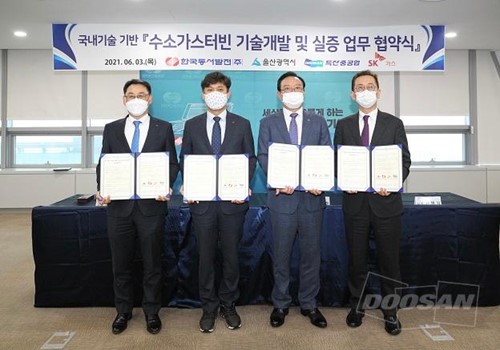News
Doosan Heavy to boost H2 gas turbine development efforts

On June 3rd, Doosan signed an MOU with Ulsan Metropolitan City, Korea East-West Power and SK Gas on pursuing a hydrogen gas turbine demonstration project. According to the MOU, Ulsan Metropolitan City will be providing administrative support on implementing infrastructure needed for the hydrogen gas turbine business, whereas Korea East-West Power will be handling the demonstration of the hydrogen gas turbine using Korean technology, and SK Gas will be in charge of laying the foundation for hydrogen supply, while Doosan will be handling the technology development and supply of hydrogen gas turbines.
All the signatories of the recent MOU will be participating in the Ulsan Combined Cycle Power Plant’s gas turbine demonstration project, which involves converting the gas turbine of the power plant, which has been operated for more than 25 years, into a 270 MW hydrogen gas turbine by 2027. This would be the first project of its kind in Korea.
On June 2nd, the company also signed an “MoU on Achieving Carbon Neutrality by 2050 and Promoting the Domestic Hydrogen Gas Turbine Business” with Korean Midland Power (KOMIPO). KOMIPO will be adopting Doosan’s technology for the hydrogen dual-fuel combustor, currently being pursued as a national project, and the hydrogen gas turbine, while Doosan will be working on the technology development for hydrogen gas turbines and securing of technology needed for mass production of related parts.
Hydrogen-fueled power plants emit less pollutants compared to that of conventional LNG-based combined cycle power plants. According to the Korea Institute of Machinery & Materials (KIMM), if a 30% hydrogen fuel mix is used, a CO2 emissions level that is 10.4% less than LNG-based power plants can be achieved and if a 50% hydrogen fuel mix is used, the emissions level can be lessened by up to 21.4%. Power plants that are fueled 100% by hydrogen generate zero carbon emissions.

